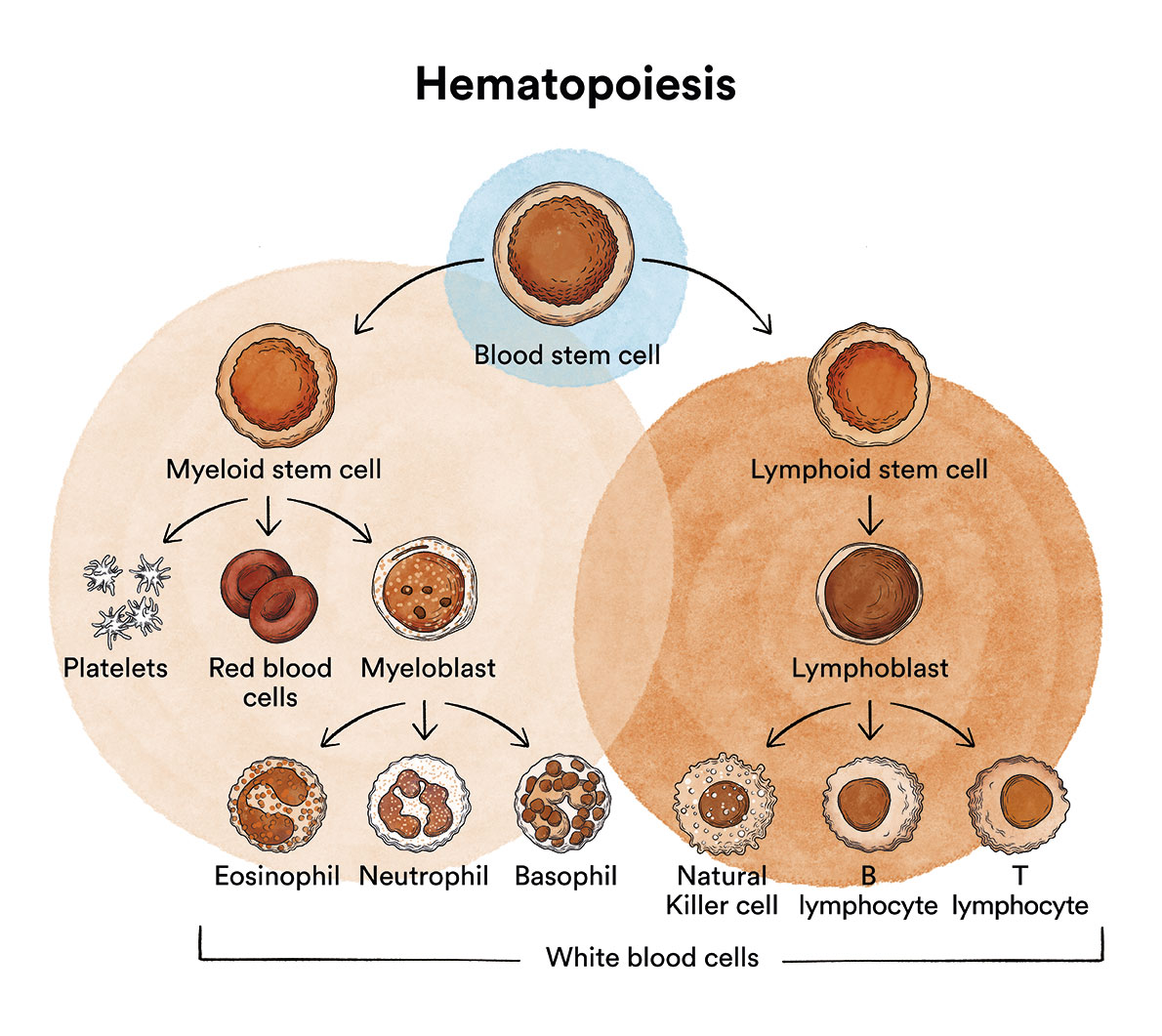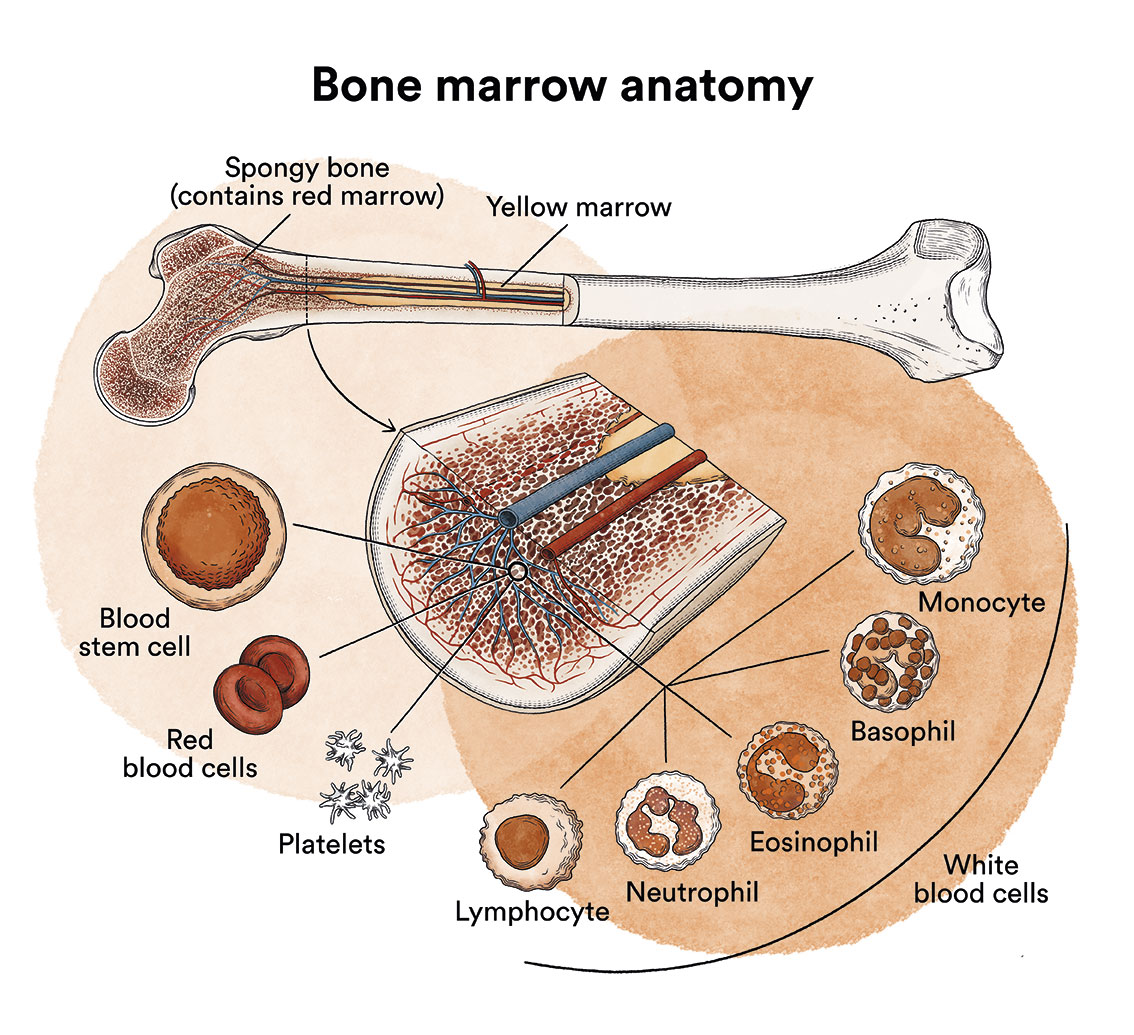Monoclonal gammopathy of undetermined significance (MGUS)
The information provided on www.fcarreras.org is intended to support, not replace, the relationship that exists between patients/visitors to this website and their physician.
Information reviewed by Dr. Rocío Parody Porras, Doctor specialising in Haematology. Member of the Management of REDMO (Bone Marrow Donor Registry) and of the Foundation’s medical team. Barcelona Medical Association (Co. 35205)
How does bone marrow work and what are the types of blood cells?
Monoclonal gammopathy of undetermined significance is a disease that originates in the bone marrow. See section Leukaemia, bone marrow and blood cells.

What is monoclonal gammopathy of undetermined significance and who does it affect?
Monoclonal gammopathy of undetermined significance (MGUS) is a disease of the bone marrow, specifically of the plasma cells, like all other monoclonal gammopathies.

Plasma cells productiImmunoglobulins (Ig), or antibodies, these substances circulate in the blood in order to defend the individual by attacking any foreign matter that enters the body. Each Ig consists of two heavy chains: gamma (IgG), alpha (IgA), mu (IgM), delta (IgD) or epsilon (IgE) and two light chains (kappa or delta).
Monoclonal gammopathies include a group of diseases characterised by clonal proliferation of plasma cells that produce a single type of light and/or heavy chain (monoclonal component) in excessive amounts. The most common is IgG.
The term monoclonal gammopathy of undetermined significance (MGUS) is used when a monoclonal component is present but diagnostic criteria for the diagnosis of multiple myeloma, primary amyloidosis, Waldenström macroglobulinemia or heavy chain disease are not given. It may also be called idiopathic monoclonal gammopathy.
The prevalence of MGUS is considerable in the elderly population, being observed in more than 1% of individuals over 60 years of age and in more than 5% of those over 80 years of age. It is more common in males and in African populations and appears to be associated with obesity.
What are the causes of monoclonal gammopathy of undetermined significance?
It is not known why monoclonal gammopathy of undetermined significance (MGUS) occurs. Genetic changes and environmental triggers appear to play a role.
MGUS is not contagious.
What are the symptoms of monoclonal gammopathy of undetermined significance?
People with monoclonal gammopathy usually experience no signs or symptoms. Some people may have a rash or nerve problems, such as numbness or tingling. People with this disorder are also more prone to bone density loss and fractures. Monoclonal gammopathy of undetermined significance is usually detected by chance when you have a blood test for another condition in most cases (60-70%).
How is monoclonal gammopathy of undetermined significance diagnosed?
Diagnosis is established by a blood test and is based on the presence of monoclonal Ig in amounts of less than 30 g/L and a percentage of plasma cells in bone marrow of less than 10%, with absence of organ damage attributable to the gammopathy (kidney, bone, etc.).
What is the treatment for monoclonal gammopathy of undetermined significance?
 All patients with MGUS should remain under routine observation and monitoring every 3 months, 6 months or 1 year, depending on the individual’s condition. This is done in order to favour early detection of any complications that may arise.
All patients with MGUS should remain under routine observation and monitoring every 3 months, 6 months or 1 year, depending on the individual’s condition. This is done in order to favour early detection of any complications that may arise.
It is important to establish the differential diagnosis between MGUS and multiple myeloma, as MGUS does not require treatment, while multiple myeloma usually does.
Patients should undergo careful diagnosis to stage their disease. Before developing active myeloma, patients go through two earlier stages of the disease. These precursor stages are monoclonal gammopathy of undetermined significance (MGUS) and quiescent multiple myeloma (QMM), also called smoldering or indolent.
Not all MGUS develop into myeloma, but all myelomas have previously been an MGUS.
What is the prognosis for patients with qmonoclonal gammopathy of undetermined significance?
For unknown reasons, according to several studies, 14%, 25% and 41% of patients with MGUS progress to multiple myeloma at 10, 20 and 25 years, respectively. The only way to establish whether MGUS is truly benign or is the first manifestation of multiple myeloma is to perform annual monitoring of the M-component (abnormal monoclonal antibody).
Currently, there is no way of knowing who will develop multiple myeloma or other types of disease (Waldenström macroglobulinemia, amyloidosis, lymphoma) but there are some factors that can tell whether the risk is higher or lower (Mayo Clinic Group criteria):
- The amount of M-protein in the blood: risk increases with a MC ≥ 1.5 g/dl
- The type of M-protein: especially if it is not IgG.
- The serum free chain ratio (FCL) if greater than 1.65. Patients with MGUS are stratified according to the number of risk factors, with low-risk patients (none of the above factors) having a 20-year risk of progression of 5%, intermediate-risk patients (1 or 2 risk factors) having a risk of 21% and 37% respectively, and high-risk patients (3 factors) 58%.
Links of interest concerning medical issues relating to monoclonal gammopathy of undetermined significance
Monoclonal Gammopathy of Undetermined Significance (MGUS). Cleveland CLinic
MGUS (monoclonal gammopathy of undetermined significance). Blood Cancer UK
MGUS (monoclonal gammopathy of unknown significance). Macmillan Cancer Center
Links of interest: local/provincial or state entities that can provide you with resources and services specialised in leukaemia or cancer patients:
In Spain there is a large network of associations for haematological cancer patients that, in many cases, can inform you, advise you and even carry out certain procedures. These are the contacts of some of them by Autonomous Communities:
All these organisations are external to the Josep Carreras Foundation.
STATE
- CEMMP (Comunidad Española de Pacientes de Mieloma Múltiple)
- AEAL (ASOCIACIÓN ESPAÑOLA DE AFECTADOS POR LINFOMA, MIELOMA y LEUCEMIA)
- AECC (ASOCIACIÓN ESPAÑOLA CONTRA EL CÁNCER). Present is the different provinces and in many municipalities. Contact with the nearest branch or call 900 100 036 (24h).
- AELCLES (Agrupación Española contra la Leucemia y Enfermedades de la Sangre)
- Josep Carreras Leukaemia Foundation
- FUNDACIÓN SANDRA IBARRA
- GEPAC (GRUPO ESPAÑOL DE PACIENTES CON CÁNCER)
- MPN España (Asociación de Afectados Por Neoplasias Mieloproliferativas Crónicas)
ANDALUCÍA
- AECC (ASOCIACIÓN ESPAÑOLA CONTRA EL CÁNCER). Present is the different provinces and in many municipalities. Contact the nearest branch.
- ALUSVI (ASOCIACIÓN LUCHA Y SONRÍE POR LA VIDA). Sevilla
- APOLEU (ASOCIACIÓN DE APOYO A PACIENTES Y FAMILIARES DE LEUCEMIA). Cádiz
ARAGÓN
- AECC (ASOCIACIÓN ESPAÑOLA CONTRA EL CÁNCER). Present is the different provinces and in many municipalities. Contact the nearest branch.
- ASPHER (ASOCIACIÓN DE PACIENTES DE ENFERMEDADES HEMATOLÓGICAS RARAS DE ARAGÓN)
- DONA MÉDULA ARAGÓN
ASTURIAS
- AECC (ASOCIACIÓN ESPAÑOLA CONTRA EL CÁNCER). Present is the different provinces and in many municipalities. Contact the nearest branch.
- ASTHEHA (ASOCIACIÓN DE TRASPLANTADOS HEMATOPOYÉTICOS Y ENFERMOS HEMATOLÓGICOS DE ASTURIAS)
CANTABRIA
- AECC (ASOCIACIÓN ESPAÑOLA CONTRA EL CÁNCER). Present is the different provinces and in many municipalities. Contact the nearest branch.
CASTILLA LA MANCHA
- AECC (ASOCIACIÓN ESPAÑOLA CONTRA EL CÁNCER). Present is the different provinces and in many municipalities. Contact the nearest branch.
CASTILLA LEÓN
- ABACES (ASOCIACIÓN BERCIANA DE AYUDA CONTRA LAS ENFERMEDADES DE LA SANGRE)
- AECC (ASOCIACIÓN ESPAÑOLA CONTRA EL CÁNCER). Present is the different provinces and in many municipalities. Contact the nearest branch.
- ALCLES (ASOCIACIÓN LEONESA CON LAS ENFERMEDADES DE LA SANGRE). León.
- ASCOL (ASOCIACIÓN CONTRA LA LEUCEMIA Y ENFERMEDADES DE LA SANGRE). Salamanca.
CATALUÑA
- ASSOCIACIÓ FÈNIX. Solsona
- FECEC (FEDERACIÓ CATALANA D’ENTITATS CONTRA EL CÁNCER
- FUNDACIÓ KÁLIDA. Barcelona
- FUNDACIÓ ROSES CONTRA EL CÀNCER. Roses
- LLIGA CONTRA EL CÀNCER COMARQUES DE TARRAGONA I TERRES DE L’EBRE. Tarragona
- MielomaCAT
- ONCOLLIGA BARCELONA. Barcelona
- ONCOLLIGA GIRONA. Girona
- ONCOLLIGA COMARQUES DE LLEIDA. Lleida
- ONCOVALLÈS. Vallès Oriental
- OSONA CONTRA EL CÀNCER. Osona
- SUPORT I COMPANYIA. Barcelona
- VILASSAR DE DALT CONTRA EL CÀNCER. Vilassar de Dalt
VALENCIAN COMMUNITY
- AECC (ASOCIACIÓN ESPAÑOLA CONTRA EL CÁNCER). Present is the different provinces and in many municipalities. Contact the nearest branch.
- ASLEUVAL (ASOCIACIÓN DE PACIENTES DE LEUCEMIA, LINFOMA, MIELOMA Y OTRAS ENFERMEDADES DE LA SANGRE DE VALENCIA)
EXTREMADURA
- AECC (ASOCIACIÓN ESPAÑOLA CONTRA EL CÁNCER). Present is the different provinces and in many municipalities. Contact the nearest branch.
- AFAL (AYUDA A FAMILIAS AFECTADAS DE LEUCEMIAS, LINFOMAS; MIELOMAS Y APLASIAS)
- AOEX (ASOCIACIÓN ONCOLÓGICA EXTREMEÑA)
GALICIA
- AECC (ASOCIACIÓN ESPAÑOLA CONTRA EL CÁNCER). Present is the different provinces and in many municipalities. Contact the nearest branch.
- ASOTRAME (ASOCIACIÓN GALLEGA DE AFECTADOS POR TRASPLANTES MEDULARES)
BALEARIC ISLANDS
- ADAA (ASSOCIACIÓ D’AJUDA A L’ACOMPANYAMENT DEL MALALT DE LES ILLES BALEARS)
- AECC (ASOCIACIÓN ESPAÑOLA CONTRA EL CÁNCER). Present is the different provinces and in many municipalities. Contact the nearest branch.
CANARY ISLANDS
- AECC (ASOCIACIÓN ESPAÑOLA CONTRA EL CÁNCER). Present is the different provinces and in many municipalities. Contact the nearest branch.
- AFOL (ASOCIACIÓN DE FAMILIAS ONCOHEMATOLÓGICAS DE LANZAROTE)
- FUNDACIÓN ALEJANDRO DA SILVA
LA RIOJA
- AECC (ASOCIACIÓN ESPAÑOLA CONTRA EL CÁNCER). Present is the different provinces and in many municipalities. Contact the nearest branch.
MADRID
- AECC (ASOCIACIÓN ESPAÑOLA CONTRA EL CÁNCER). Present is the different provinces and in many municipalities. Contact the nearest branch.
- AEAL (ASOCIACIÓN ESPAÑOLA DE LEUCEMIA Y LINFOMA)
- CRIS CONTRA EL CÁNCER
- FUNDACIÓN LEUCEMIA Y LINFOMA
MURCIA
- AECC (ASOCIACIÓN ESPAÑOLA CONTRA EL CÁNCER). Present is the different provinces and in many municipalities. Contact the nearest branch.
NAVARRA
- AECC (ASOCIACIÓN ESPAÑOLA CONTRA EL CÁNCER). Present is the different provinces and in many municipalities. Contact the nearest branch.
BASQUE COUNTRY
- AECC (ASOCIACIÓN ESPAÑOLA CONTRA EL CÁNCER). Present is the different provinces and in many municipalities. Contact the nearest branch.
- PAUSOZ-PAUSO. Bilbao
AUTONOMOUS CITIES OF CEUTA AND MELILLA
- AECC CEUTA (ASOCIACIÓN ESPAÑOLA CONTRA EL CÁNCER)
- AECC MELILLA (ASOCIACIÓN ESPAÑOLA CONTRA EL CÁNCER)
Support and assistance
We also invite you to follow us through our main social media (Facebook, Twitter and Instagram) where we often share testimonies of overcoming this disease.
If you live in Spain, you can also contact us by sending an e-mail to imparables@fcarreras.es so that we can help you get in touch with other people who have overcome this disease.

* In accordance with Law 34/2002 on Information Society Services and Electronic Commerce (LSSICE), the Josep Carreras Leukemia Foundation informs that all medical information available on www.fcarreras.org has been reviewed and accredited by Dr. Enric Carreras Pons, Member No. 9438, Barcelona, Doctor in Medicine and Surgery, Specialist in Internal Medicine, Specialist in Hematology and Hemotherapy and Senior Consultant of the Foundation; and by Dr. Rocío Parody Porras, Member No. 35205, Barcelona, Doctor in Medicine and Surgery, Specialist in Hematology and Hemotherapy and attached to the Medical Directorate of the Registry of Bone Marrow Donors (REDMO) of the Foundation).
Become a member of the cure for leukaemia!


